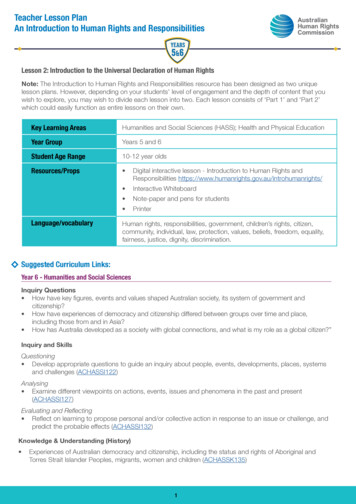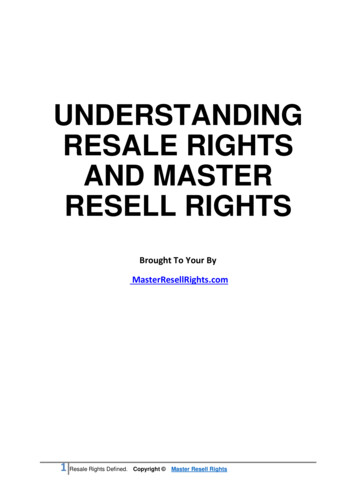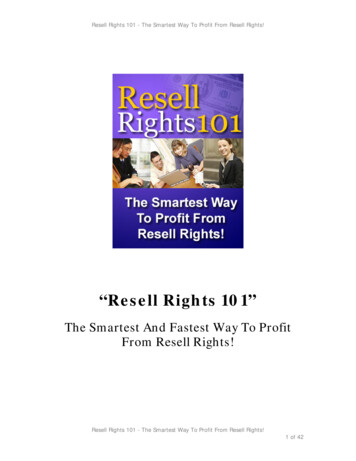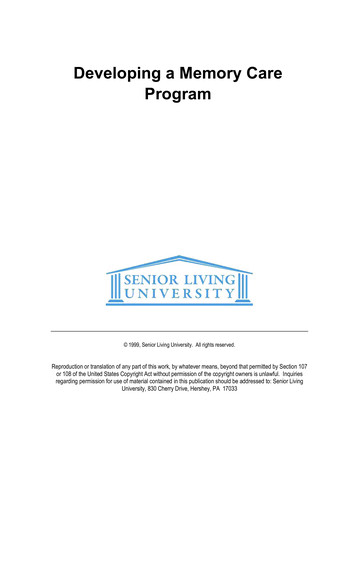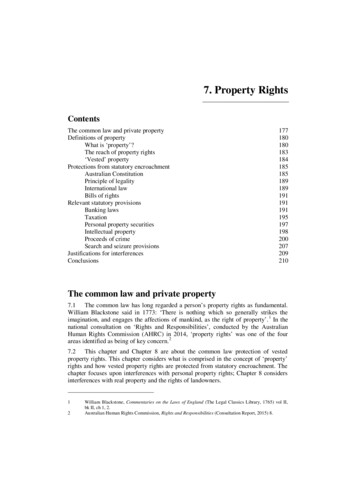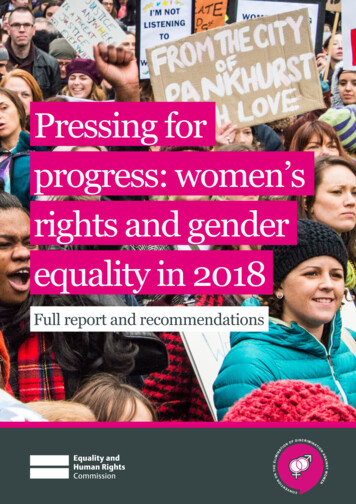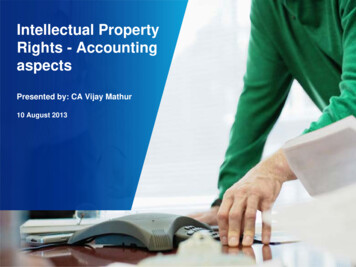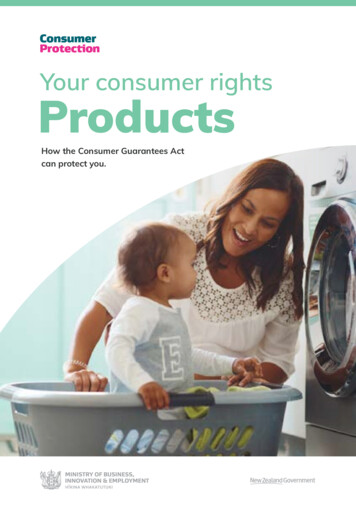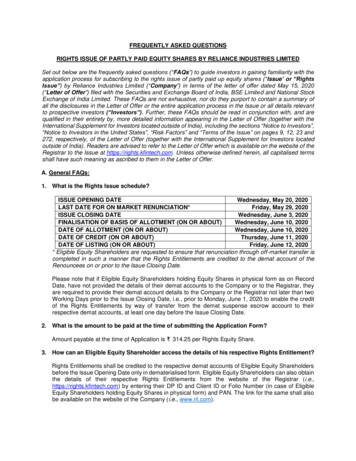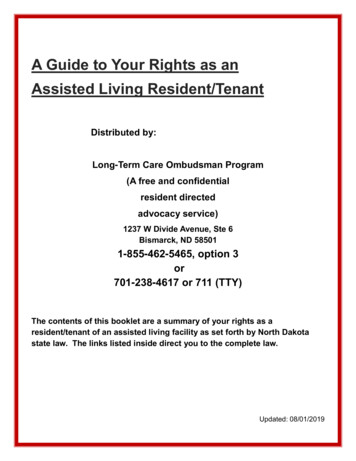
Transcription
A Guide to Your Rights as anAssisted Living Resident/TenantDistributed by:Long-Term Care Ombudsman Program(A free and confidentialresident directedadvocacy service)1237 W Divide Avenue, Ste 6Bismarck, ND 585011-855-462-5465, option 3or701-238-4617 or 711 (TTY)The contents of this booklet are a summary of your rights as aresident/tenant of an assisted living facility as set forth by North Dakotastate law. The links listed inside direct you to the complete law.Updated: 08/01/2019
Dear Resident,This booklet provides a summary of the rights you have in your new homein the assisted living facility. You keep the rights you had before this moveand are still in charge of your choice and lifestyle. If you experiencememory and understanding changes, your power of attorney documentsmay go into effect or a court may determine a guardian needs to manageyour health and/or financial decisions. Even if you have such arepresentative you should still be informed and consulted about decisionsthat involve you.Remember and respect that the other residents in the facility have thesame rights as you. Your choices and actions should not interfere withtheir rights.If you, or any of your family or friends, have questions about the rights andhow they apply to a situation, you may ask facility staff, or you may call theLong-Term Care Ombudsman Program at 701-328-4617 or 1-855-462-5465(choose option 3).Sincerely,The Long-Term Care OmbudsmenAging Services Division
An Assisted Living Facility is a building that has at least five (5) separateliving units where individualized support services are made availableto individuals to accommodate needs and inabilities to enableindividuals to remain independent.North Dakota Century Code and Administrative Rules North Dakota Century Code 50-10.2 Rights of Health Care FacilityResidentsScan below with your smart phone to connect with web site North Dakota Century Code 50-32 - Assisted Living North Dakota Century Code 47-16 – Leasing of Real Property (alsoknown as Landlord Tenant Law) North Dakota Century Code 23-09 - Lodging Establishments andAssisted Living Facilities North Dakota Administrative Code 75-03-34 - Licensing of AssistedLiving Facilities North Dakota Administrative Code 33-33-04 - Food Code North Dakota Administrative Code 33-33-05 - Smoke Detectors North Dakota Administrative Code 33-33-09 - Emergency Lighting,Emergency Plans, and Sprinkler Systems
YOU HAVE THE RIGHT TO BE INFORMED About the details of your lease, and the tenancy agreement which lists the tenancycriteriaAbout the services offered by the assisted living facility and the costsAbout changes in cost or the availability of services at least 30 days before the changeAbout refund policiesAbout your rights, your responsibilities, the assisted living responsibilities and the ruleson resident conduct.About the facility’s grievance processYOU HAVE THE RIGHT TO CHOOSE Your pharmacy, doctor, and other health care providersYour daily routineHow to spend your moneyWhat activities to participate in both at the assisted living facility and in the communityWho you want as visitorsYOU HAVE THE RIGHT TO PRIVACY In your living areaIn receiving unopened mail, private conversations by telephone and during visitsRegarding your personal, medical or financial information and to authorize with whominformation can be sharedYOU HAVE THE RIGHT TO BE FREE FROM Mental and physical abuse, even the threat of abuseNeglectFinancial exploitationDiscriminationRetaliation or the fear of retaliation for presenting complaintsPhysical or chemical restraintsYOU HAVE THE RIGHT TO Live in a safe and clean environment. (Facility must follow fire and life safety codes and,when applicable, food establishment inspections.)Be treated with courtesy, fairness, and with the fullest measure of dignity and respect.Have your individuality respected.Have your belongings with you, have their security protected, and have a locked space.To present concerns and recommendations to the assisted living staff.Be given written notice if the assisted living management wants you to move and endyour lease and tenancy agreement. This can be done only for specific reasons – medical reasons, your welfare orthat of other residents/tenants or if you aren’t paying your rent and fees
FACILITY LICENSURE The Assisted living Facility must certify that operation of its facility follows all applicablefederal, state, and local laws.An Assisted Living Facility must display its license(s) in a conspicuous place on itspremises.The Assisted Living Facility must notify all tenants and third-party payers of theDepartment’s revocation of its license within fifteen days from the date of the finalrevocation notice.An Assisted Living Facility cannot advertise or claim to be an Alzheimer’s, dementia, orspecial memory care facility. That requires licensure as either a basic care facility or askilled nursing facility.YOU HAVE THE RIGHT TO VOICE COMPLAINTSWITHOUT FEAR OF RETALIATION TO Your family and friendsOthers living at the facilityFacility staff, facility administrator, government officialsAssisted Licensing personnelThe ombudsmanThe Assisted Living Facility must provide each tenant with written notice of how they mayreport a complaint.Effective August 1, 2019;Notice of Right to Place and Use an Electronic Monitoring Device in your Roomat a Long-Term Care Facility (assisted living, basic care, nursing home, swing bed)WHO has the right to place and use an authorized electronic monitoring device in your room? A resident of a facility; orA resident representative of the resident (if the resident is not able to consent toelectronic monitoring).o Must be a power of attorney for health care (agent must be in effect as per theterms of the POA document); oro Guardian of the residentWHEN can you exercise this right to install and use an authorized electronic monitoringdevice? The authorized electronic monitoring law goes into effect on August 1, 2019.Then must complete and submit the applicable notices and authorizations.Also, you may choose to install an authorized electronic monitoring device in your roomat any time while you reside in the long-term care facility if all the necessarydocumentation is completed and submitted.WHAT should be considered before giving consent? You should know what you are givingconsent to.Video deviceAll residents in the room should consider the following.
Who, and what, may be captured on video e.g. visitors, equipment in room, personalcares provided, intimate relations, etc. With whom will you share the recording? What restrictions do you want placed onsharing of the video recording? If there will be intimate times with a significant other do you want the recording turnedoff during those times?Audio deviceAll residents in the room should consider the following. The device will likely record conversations with staff, family and friends, etc. for both theresident wanting the recording and for any other resident sharing the room. This maymean private information about finances, family relationships, and health informationmay be recorded.With whom will you share the recording? Do you want all conversations and possiblyprivate information being on a recording? Do you plan to go to a family room orconference room for private conversations?WHAT is the process to use an authorized electronic monitoring device in your room at thefacility? ALL the following is required by law.1. WRITTEN NOTICE GIVEN TO LONG-TERM CARE FACILITYa. You, the resident, or your resident representative, must complete and give aNotice to Facility of your intent to place and use an authorized electronicmonitoring device.b. You, or your resident representative, must give the facility an installation planthat follows the facility’s regulations and policies.2. DOCUMENTATION OF CONSENTa. You, the resident, or the resident representative, completes a document showingconsent.b. Each of the resident’s roommates, or his/her resident representatives, must alsocomplete a document of consent.i. The roommate may put limits on the authorized electronic monitoringdevice and all of the limits must be followed for the authorized electronicmonitoring device to be used.c. The documentation of consent includes:i. Written consent for the placement and use of the authorized electronicmonitoring device andii. written authorization for disclosure of protected health information andiii. written release of liability of the facility for violation of a resident’s privacyresulting from the use of an authorized electronic monitoring device.3. PAYMENTa. You, the resident, or your resident representative, are responsible to pay for theauthorized electronic monitoring device, and all installation, operation,maintenance, and removal costs associated with the device except for electricity.
4. INFORMATION REQUIRED ON VIDEO RECORDINGSa. All recordings from a video electronic monitoring device must include the dateand time of the recording.5. AUTHORIZED ELECTRONIC MONITORING DEVICEa. The authorized electronic monitoring device shall be in a fixed, stationaryposition.b. The authorized electronic monitoring device shall be directed only on the residentwho initiated the installation and use of the authorized electronic monitoringdevice.c. The authorized electronic monitoring device shall be placed for maximumprotection of the privacy and dignity of the resident and the roommate.A person may be subject to a Class B misdemeanor if he Intentionally hampers, obstructs, tampers with or destroys arecording or an authorized electronic monitoring device placed ina resident’s room without the express written consent of theresident or resident representative.A person may be guilty of a crime or civilly liable if he Unlawfully violates the privacy rights of another by placing anelectronic monitoring device in the room of a resident or by usingor disclosing a tape or other recording made by the device. You can choose at any time to revoke your consent to have an authorized electronicmonitoring device in your room by written notice. The roommate must agree to the use of an authorized electronic monitoring device inthe room or it can’t be used. You can request to move to a different room with aroommate that will agree to the use of an authorized electronic monitoring device A facility cannot refuse to admit you or discharge you if you choose to have anauthorized electronic monitoring device.A facility, or staff of the facility, may not access any recording from the authorized electronicmonitoring device without written permission from you or your resident representative, or acourt order.IMPORTANT AGENCIES AND CONTACT INFORMATIONLong-Term Care Ombudsman Program(For information or to report a concern about health, safety or welfareor rights of a resident of assisted living)Phone: 1-855-462-5465 (toll free), option 3701-328-4617711 (TTY)Address: 1237 W Divide Ave Suite 6; Bismarck ND 58501e-mail: dhsagingombud@nd.gov
Link for online complaint sing AuthorityMelanie Phillips, Administrator, Long Term Care ContinuumDivision of Medical ServicesND Department of Human Services600 East Boulevard Avenue, Dept 325Phone: 701-328-2321Fax: 701-328-1544E-mail: mdphillips@nd.govVulnerable Adult Protective ServicesTo report abuse, neglect or financial exploitation of a vulnerable adult E-mail: SFN 1607 Report of Vulnerable Adult Abuse, Neglect, orExploitation https://www.nd.gov/eforms/Doc/sfn01607.pdfor FAX it to 701-328-8744 Link for online reporting: https://fw2.harmonyis.net/NDLiveIntake/ Make a report by telephone. Call the central intake line at 1-855-4625465, "Press 2". NOTE: The Aging and Disability Resource LINK Vulnerable Adult Protective Services intake line is answered weekdaysbetween 8 a.m. and 5 p.m., Central Time. Please leave a message,including your contact information, if you call after hours.State Health Insurance Counseling Program (SHIC)Offers free help with Medicare and other health insurance includingterm care insurance.Phone: 1-888-575-6611 or 1-701-328-2440Address: 600 E Boulevard Ave Bismarck ND 58505-0320e-mail: ndshic@nd.govlong
The next two pages show a comparison of the different levels of long-term care facilitiesavailable in North Dakota.ASSISTED LIVING(most independent)BASIC CARE(needing more assistance)SKILLED NURSING HOME(needing skilled nursing care)DefinitionAn apartment setting thatprovides or coordinatesindividualized supportservices (see Features) tomeet the resident's needsand abilities to maintain asmuch independence aspossible.A residence that providesroom and board to peoplewho because of impairedability for independentliving, require health, social,or personal care services.Basic Care residents do notrequire regular 24-hourmedical or nursing services.Staff are available torespond at all times to meetthe 24-hour per dayscheduled and unscheduledneeds of a resident. SomeBasic Care facilities areAlzheimer's, dementia, ormemory care units.A facility that provides room andboard AND 24-hourcare/supervision to its residents.This facility is under thesupervision of a licensed healthcare practitioner and has 24-hournursing care.FeaturesServices (commonly referredto as ServicePlan/Contract/Level/Package) are purchased at costsabove rental fees accordingto the resident's needs.Services MAY include meals,housekeeping, laundry,activities, 24-hoursupervision, personal care,medication reminders, andvarying levels of health careservices. This setting is NOTappropriate for memoryimpaired (advanced stage)residents. Residents maychoose additional in-homeProvides room and board aswell as health and socialservices. Assistance withActivities of Daily Living(ADLs) is provided 24-hoursper day. Also includesrecreational and therapeuticactivities, dietaryconsultation, andmedication administration.Provides room and board andALSO nursing, medical,rehabilitative care, recreationalactivities, social services,assistance with Activities of DailyLiving (ADLs), and protectivesupervision 24-hours a day.
care agencies to supplementservices.LicenseLicensed by ND Dept. ofHuman ServicesLicensed by ND Dept. ofHealthLicensed by ND Dept. of HealthRegulation/OversightNo state oversight Landlord Tenant Law and NDContract Law apply. It is upto the resident to managetheir contract/lease andmonitor costs and services.Surveyed by ND Dept. ofHealth every 3-5 yrs.Surveyed annually by ND Dept. ofHealthPaymentHousing is a landlord/tenantrental agreement, so billedseparately from Services.Usually private pay(resident's own incomesources/assets) or may becovered partially throughLong Term Care insurance.One rate is billed for roomand board, personal care,and ADL assistance. May beprivate pay (resident's ownincome sources/assets) orpaid through the state'sBasic Care program.Individual rates include room andboard, personal cares, nursing andADLs assistance. May be privatepay (resident's own incomesources/assets), through LongTerm Care insurance, through thestate Medicaid Program, orMedicare. There may be limits onthe types of services paid for or thelength of time benefits can beutilized.Nursing StaffAvailabilityNO set requirement orregulation. May not have anyafter-hours or overnight staffon duty.RESPONSE staff areavailable at all times to meetthe 24-hour per dayscheduled and unscheduledneeds to residents.Sufficient qualified nursingpersonnel on duty at all times tomeet the nursing care needs of theresidents. Required staff are atleast 1 registered nurse on duty 8consecutive hrs. per day, 7 days aweek, AND at least 1 licensed nurseon duty and designated to workcharge 24-hours a day, 7 days a
week.AdditionalFactsMost issues with leaseagreement or lease contractneed to be resolved betweentenant and facility due to NOoversight by a state entity.Residence in an ALF with anattached Basic Care or SNFfacility does not guaranteeyou placement in that levelof care should you require it- placement depends uponavailability and facilityadmission protocol. Therecan be many additionalcosts associated with thislevel of care.Not required to have regular24-hour medical or nursingservices; only RESPONSEstaff.Not staffed by a physician; aphysician is available forconsultation at all times. There aredifferences among SNFs withregard to services provided (i.e. IVtherapy, wound care, etc.) Nursinghomes should disclose toresidents/potential residents itsspecial characteristics or servicelimitations. There is no mandatedstaff to resident ratio - facilities arerequired to be staffed to adequatelymeet the needs of the total numberof residents.Activities of Daily Living (ADLs): Eating, Bathing, Dressing, Toileting, Transferring (walking) and Continence.
FACILITY LICENSURE The Assisted living Facility must certify that operation of its facility follows all applicable federal, state, and local laws. An Assisted Living Facility must display its license(s) in a conspicuous place on its premises. The Assisted Living Facility must notify all tenants and third-party payers of the
